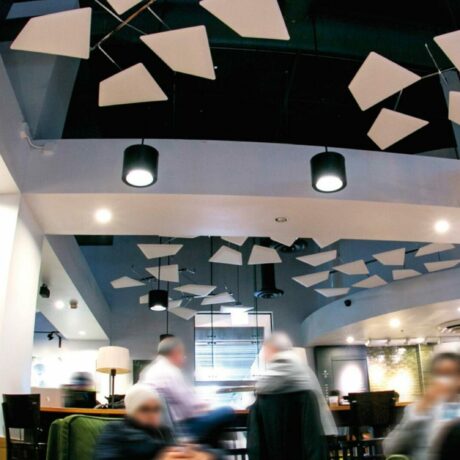
No one could have anticipated the impact that COVID-19 would have on businesses across the United States. Months after businesses were forced to shut their doors with little notice, some have closed for good, and others are struggling to make ends meet. The Society for Human Research Management found that 62% of small businesses are reporting a decrease in revenue since the pandemic began and that 52% of small businesses expect to close within six months.
Help arrived for some businesses through the CARES Act, but for others it was too late or too difficult to obtain. However, there could be other options for financial relief for these businesses. One of them is to file a claim on their business insurance policy if they can get their claims approved.
The American Property Casualty Insurance Association (APCIA) estimates losses in the United States could be between $220 billion and $383 billion per month for small businesses. Additionally, the insurance industry could see as many as 30 million claims from small businesses related to COVID-19. Insurance companies have already begun denying these claims across the board without investigation.
What it Covers

Businesses face liability and risks every day. Business interruption insurance provides protection from these risks and can help owners guard their financial assets as well as their intellectual and physical property against several situations, such as: Property damage; Lawsuits; Lost business income; and Other covered losses
Business interruption insurance provides protection for businesses that suffer economic losses when they are unable to run their business as usual. This coverage is designed to provide economic support for a business if there is an unforeseen event. Business interruption insurance usually pays for the loss of revenue that the business would have earned during the time of the closure, and typically should put the insured business in the same financial position that they were in before the event that caused the claim. Similar to other types of insurance, a business pays a premium to their business interruption insurance carrier to keep the coverage active.
The Four Types of Business Interruption Insurance Coverage

Businesses filing an interruption insurance claim can rely on a few different types of coverages.
Business Income Coverage – This standard coverage provides benefits for the loss of business income experienced because of the suspense of necessary operations during a period of restoration. Typically, the suspension must be due to the direct physical loss or physical damage to real property or to personal property within 1,000 feet of the premises that is out in the open. A claim under this coverage type must include a direct physical loss or damage to a covered property due to a covered cause of loss causing the suspension of the insured’s operations
Extended Business Income Coverage – This type of coverage pays for extra expenses that are above and beyond regular monthly business expenses spent to restore a business, whether they are at the original location or a temporary one. These expenses can potentially include: market share maintenance; employee and customer safety; maintaining goodwill; securing the property; additional manpower; temporary facilities; and fulfillment of contracts.
Contingent Business Interruption Coverage – The purpose of this type of coverage is to provide compensation for any income lost due to property loss or damage at the supplier’s or customer’s location. A contingent business interruption must include: a physical loss or property damage included in the policy to a supplier or customer’s property by a covered peril which causes an interruption and loss of profits or additional expense to the business of the insured. (Examples include the closure of manufacturing facilities, grounded airplanes, or canceled cruise travel.)
Civil Authority Coverage – This coverage can apply when the federal, state, or local government directs the closure or reduced operations as a result of a dangerous physical condition. Civil authority coverage pays for the loss of business income resulting from the inability to access the insured property when it is prohibited by order of civil authority due to a covered cause of loss to a property in the proximity of the insured property. Examples of situations in which this type of coverage would apply include:
- Access to the area of the damaged property is not allowed per civil authority due to the damage.
- The premises must be within the immediate area and not more than one mile from the damaged property.
- A perilous physical condition exists, resulting in action by civil authority to forbid access to the area, or the action is taken to let civil authority have unhindered access to the damaged property.
What You Need to Know About COVID-19
As numerous business industries are experiencing the difficult financial realities of the coronavirus pandemic, it is no wonder that thousands have filed business interruption claims all over the United States. Sadly, for these businesses, most insurers are denying such claims as a matter of course. Insurance companies are citing numerous policy exclusions for their denials, even on policies that have no exclusions.
Many businesses dutifully paid their premiums and had a reasonable expectation their policies would cover their financial losses caused by coronavirus only to have their claims immediately denied. Do they have any recourse?
Insurance companies cannot reasonably argue that the coronavirus did not lead to the suspension of business operations across the entire country, which caused overwhelming business losses. What the insurance companies refute, however, is that the presence of coronavirus on the premises constitutes physical loss or damage.
When it comes to COVID-19 and civil authority coverage, insurers argue that this coverage does not apply because the orders do not meet the geographic limitation requirement. However, state and local orders given in response to COVID-19 were caused by a widespread virus or imminent threat of the virus in areas under the orders. It can be argued that geographic restriction does not apply in these cases.
Property Damage or Physical Loss
Every insurance policy, even ones through the same insurer, can have different language in the policy declarations or different types of coverages. Most business interruption policies cover situations in which a business must close or reduce operations because of property damage. This does not merely mean your typical property damage caused by a fire or vandalism.
Property damages within the meaning of a business interruption policy could include damage to the property caused by infected customers or clients. This type of damage happens or could happen because coronavirus is easily transmittable and has the ability to remain on some surfaces for hours or even days. For example, it can live on cardboard for as long as 24 hours and on plastic and stainless steel for two to three days.
The issue becomes whether the presence of the coronavirus is physical loss or damage, as defined by the business insurance policy. This is a new issue that has not been previously examined in court. Typically, proving a physical loss or damage under the context of business interruption requires more than a temporary viral contamination that can be mitigated quickly and economically.
There are some courts, however, that interpret the definition of direct physical loss applied to business interruption insurance broadly. Most cases support that physical damage to the property is not necessary if the building was left unusable due to physical forces. For example, ammonia gas or gasoline vapors within a building, the tripping of power equipment to avoid overloading the electrical system in a building, e. coli found in a well, mold, asbestos, the presence of carbon monoxide, and in general a change that resulted in the temporary or permanent inability to use or inhabit the property have all been found to constitute property damage within the meaning of business interruption policies.
Coverage Exclusions
Insurance policies can have many exclusions or circumstances in which there is no claim available. Depending on the policy, exclusions to coverage can include: 1) Bacteria/Fungus. These can limit the amount of a claim, but since neither one of these categorize the coronavirus, it does not apply; and 2) Virus. Some policies may in fact list a virus as an exclusion; however, there are legal theories supporting business insurance policies accepting claims for coronavirus.
The Mandarin Oriental International Hotel made a previous business income claim as a result of a SARS outbreak and received insurance payouts totaling over $16 billion. As a result, in 2006, some insurance companies began to write exclusions for viruses into their policies. However, before they are allowed to add new exclusions to their policies, insurance companies must get approval from the state. Insurers indicated to multiple states that their policies were not intended and have not been a source of recovery related to disease-causing agents. That same year, the courts discovered that property insurance policies previously covered many different claims related to e.coli bacteria, health-threatening organisms, radioactive dust, lead, mold, mildew, noxious air particles, pesticides, and vaporized agricultural chemicals, invalidating their argument.
A similar position was used by insurance companies to seek regulatory approval of the sudden and accidental pollution exclusion. In this area, the majority of courts did not accept the insurers’ stance and denied their right to apply the exclusion.
Courts have set precedents when it comes to insurance companies and their exclusions. For example, the insurance company must establish that an exclusion applies in a specific situation. According to the courts, the burden of the insurance company to prove that coverage does not apply in an all-risk policy is heavy. Generally, insurance policies are interpreted in a way that is most beneficial to the insured party. In addition, courts typically construe exclusions narrowly in favor of insurance coverage.
What Damages Can Be Claimed for COVID-19?
Even if a business does not make a profit, it can make a claim for the damage caused by the coronavirus outbreak. The claim can include net profit, overhead, and labor. Typical coverage length is as follows per policy/claim type: Business interruption—12 months; Civil authority—One month; and Dependent Property Coverage—12 months.
Business owners might also be entitled to coverage for other losses. For instance, they may be entitled to benefits needed to limit the suspension of business or to repair or replace property or extended business income losses to cover when the business is operational until it returns to regular activity and profits.
Current Litigation
As of late May 2020, 120 lawsuits are pending nationwide against 33 different insurance carriers, including insurance giants like USAA, State Farm, Liberty Mutual, Nationwide, American Family, Farmers, Twin City Fire Insurance, and Hartford. Many more lawsuits are expected as claims are filed and subsequently denied. Lawsuits already in progress include multi-district litigation cases and class action lawsuits. Nearly 40 of these are both federal and state class-action suits.
Additionally, there are multiple states proposing legislation that would enforce insurance companies to cover business interruption claims related to COVID-19. These states include Louisiana, Massachusetts, New Jersey, New York, Ohio, Pennsylvania, and South Carolina.
These states are not alone, as even the president has indicated that he thinks that these claims should be paid. The following states have issued specific notices to insurance companies concerning the coronavirus and business interruption claims: California, Colorado, Kansas, Louisiana, Massachusetts, Minnesota, Mississippi, Missouri, New Hampshire, North Dakota, Oregon, South Carolina, Virginia, and Washington.
How to Proceed
First, read your full policy, especially if your business is in the hospitality, travel, healthcare, or event-based industries. Some policies could have specialized business interruption coverage. For example, Wimbledon paid $2 million a year for pandemic insurance coverage and has now filed a $141 million insurance claim. Look to see if your policy has an exclusion for viruses. If it does not, it can be argued that your insurance carrier did not intend to exclude this type of coverage.
If you have already filed a claim with your business insurance company based on a COVID-19 reason, it likely has been or will be rejected by the insurance company based on several arguments. Whether you have already filed a claim or are interested in filing one, it is best to meet with an experienced attorney so that you can have a better understanding of your rights as the insured, as well as your policy and its exclusions.
Some attorneys are offering to represent claimants on a contingency basis, meaning they only get paid if they obtain a recovery for your financial business losses. It is important to pursue this matter sooner rather than later as many policies require claimants to file within 30-60 days; however, sometimes, the law provides additional time. You need to know that you have rights under your insurance policy. Your insurance company has an obligation to your business to fulfill its duties under your business insurance policy. You should seek legal counsel to protect your rights during this economically uncertain and challenging time in history.




